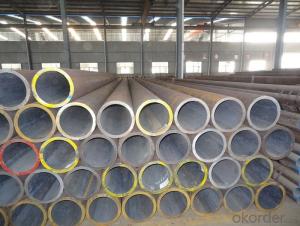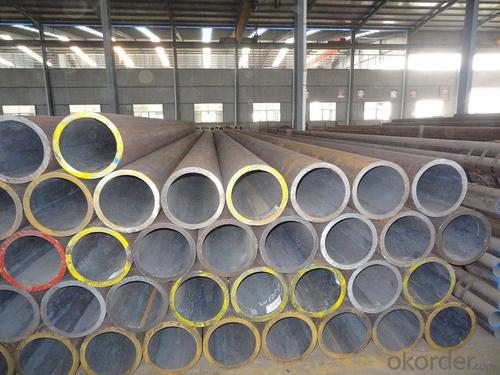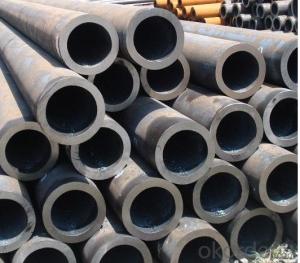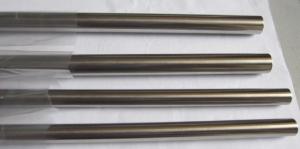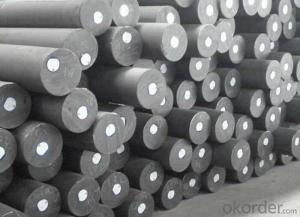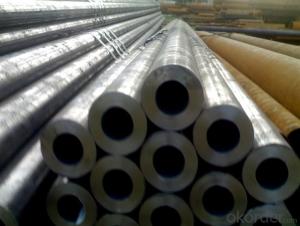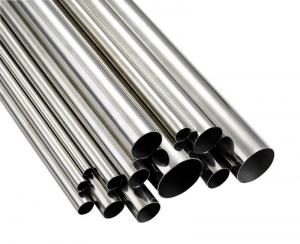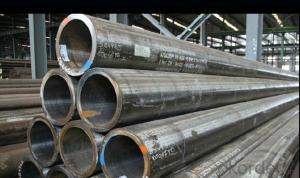Seamless Ferritic Alloy-Steel Pipe for High-Temperature Service ASTM A335 P11
- Loading Port:
- Shanghai
- Payment Terms:
- TT OR LC
- Min Order Qty:
- 1000 kg
- Supply Capability:
- 10000 kg/month
OKorder Service Pledge
OKorder Financial Service
You Might Also Like
Specifications
ASTM A335 Seamless Alloy-Steel Pipe
Standard: BS 1139, BS 3059-2, JIS G3454-2007
Grade: 10#-45#, 15NiCuMoNb5, 10Cr9Mo1VNb
Detailed introduction to ASTM A335 seamless alloy steel pipe:
ASTM A335 seamless alloy steel pipe
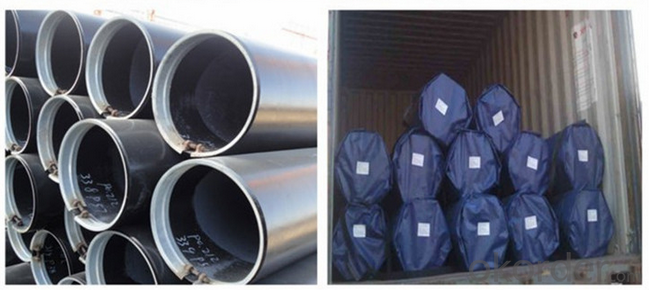
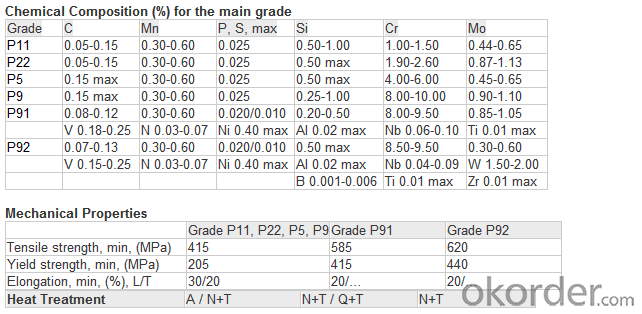
FAQ:
1) why you chose us ?
Professional Manufacturer and supplier of Steel pipe
More than 14 years’ professional producing experience
We can get the lowest ex-factory prices. The price are quite reasonable and it is lower than our commercial peers. also, we can guarantee the qualities of our products.
BV, ISO certificates and SGS test can be provided to assure the quality of our products.
2) Our minimum order quantity:
10 Metric Tons or one 20ft or 40ft Container.
3) How about the Delivery Time?
The steel pipe will be produced since we getting your deposit by T/T or Your original L/C. For normal size, some stocks in our factory now, we can supply once you need.
4)What kind of payment does your company support?
T/T, 100% L/C at sight, Cash, Western Union are all accepted.
5) Do you charge for the samples?
According to our company principle, we just charge for samples, you pay for the freight /courier charge.
6) Main market:
Mid East, South America, Africa, Southeast Asia, India etc
- Q: How are steel pipes used in the construction of desalination plants?
- Steel pipes are commonly used in the construction of desalination plants for various purposes. They are primarily utilized for the transportation of seawater and brine, as well as for the distribution of fresh water throughout the plant. Steel pipes are preferred due to their durability, corrosion resistance, and ability to withstand high pressure and extreme temperatures. Additionally, they can be easily welded together, allowing for efficient installation and maintenance.
- Q: Are steel pipes suitable for underground oil pipelines?
- Steel pipes are indeed appropriate for underground oil pipelines. Steel is frequently employed in oil pipelines because of its considerable strength, durability, and resistance to corrosion. Underground oil pipelines encounter different external influences like soil displacement, humidity, and chemicals, but steel pipes can effectively endure these circumstances. Furthermore, by welding steel pipes, a seamless and uninterrupted pipeline can be formed, minimizing the chances of leaks or ruptures. Furthermore, steel pipes have a long history of successful utilization in the oil sector, offering a dependable and cost-efficient method of transporting oil underground.
- Q: Can steel pipes be used for geothermal energy systems?
- Yes, steel pipes can be used for geothermal energy systems. Steel pipes are commonly used for their durability and resistance to high temperatures, making them suitable for transporting hot water or steam in geothermal energy systems. Additionally, steel pipes have excellent corrosion resistance, which is crucial for geothermal environments that often contain corrosive substances.
- Q: Can steel pipes be used for underground fuel pipelines?
- Yes, steel pipes can be used for underground fuel pipelines. Steel pipes are commonly used for various types of pipelines due to their durability, strength, and resistance to corrosion. When it comes to underground fuel pipelines, steel pipes are a popular choice due to their ability to withstand high pressure and temperature fluctuations. Additionally, steel pipes provide excellent protection against external elements, such as soil movement or chemical reactions, ensuring the safety and integrity of the fuel transportation system. Proper insulation and coating can further enhance the corrosion resistance of steel pipes, making them a reliable option for underground fuel pipelines.
- Q: What is the purpose of pipe flanges in steel pipes?
- The purpose of pipe flanges in steel pipes is to provide a secure and leak-proof connection between two pipes or fittings. Flanges act as a connection point, allowing easy assembly and disassembly of pipes while ensuring a tight seal to prevent any leakage or loss of fluid or gas.
- Q: How do steel pipes handle pressure surges?
- Steel pipes are known for their strength and durability, which allows them to handle pressure surges effectively. When pressure surges occur in a pipeline system, steel pipes have the ability to withstand and absorb the increased force without breaking or rupturing. The high tensile strength of steel provides resistance against the pressure exerted on the pipes, preventing them from deforming or collapsing under the sudden surge. Additionally, steel pipes have a high burst pressure rating, meaning they can withstand significant increases in pressure without failing. Furthermore, steel pipes are often designed with a thicker wall thickness, which adds to their ability to handle pressure surges. The thickness of the pipe walls helps to distribute the increased force evenly, minimizing the risk of localized stress and potential failure points. Moreover, steel pipes are commonly used in conjunction with fittings and valves that are specifically designed to handle pressure surges. These fittings and valves are made from similar materials, ensuring compatibility and maintaining the integrity of the pipeline system. Overall, steel pipes are well-suited for handling pressure surges due to their strength, durability, and ability to withstand high pressures. Their resistance to deformation, high burst pressure rating, and compatibility with specialized fittings and valves make them a reliable choice for applications where pressure surges may occur.
- Q: Can steel pipes be used for natural gas processing plants?
- Yes, steel pipes can be used for natural gas processing plants. Steel pipes are commonly used in the oil and gas industry due to their high strength, durability, and resistance to corrosion. They can safely transport natural gas and are capable of withstanding the high pressure and temperature conditions typically found in processing plants.
- Q: Where is the difference between seamless steel pipe and welded pipe?
- In appearance, seamless steel pipe and welded steel pipe difference in the welded pipe wall welded tendons, and seamless No.
- Q: What are the advantages of using steel pipes in the manufacturing of furniture?
- Using steel pipes in the manufacturing of furniture offers several advantages. Firstly, steel pipes are known for their strong and durable nature, providing furniture with the necessary strength and stability. Additionally, steel pipes have a high load-bearing capacity, making them suitable for supporting heavy furniture items. Furthermore, steel pipes are resistant to rust and corrosion, ensuring the longevity of the furniture. Lastly, steel pipes can be easily shaped and welded, allowing for versatile and customizable furniture designs.
- Q: How do steel pipes perform in high-temperature applications?
- Steel pipes perform well in high-temperature applications due to their excellent heat resistance and structural integrity. The high melting point of steel allows it to withstand extreme temperatures without deformation or failure. Additionally, steel pipes have good thermal conductivity, which ensures efficient heat transfer in industrial processes.
Send your message to us
Seamless Ferritic Alloy-Steel Pipe for High-Temperature Service ASTM A335 P11
- Loading Port:
- Shanghai
- Payment Terms:
- TT OR LC
- Min Order Qty:
- 1000 kg
- Supply Capability:
- 10000 kg/month
OKorder Service Pledge
OKorder Financial Service
Similar products
Hot products
Hot Searches
Related keywords
